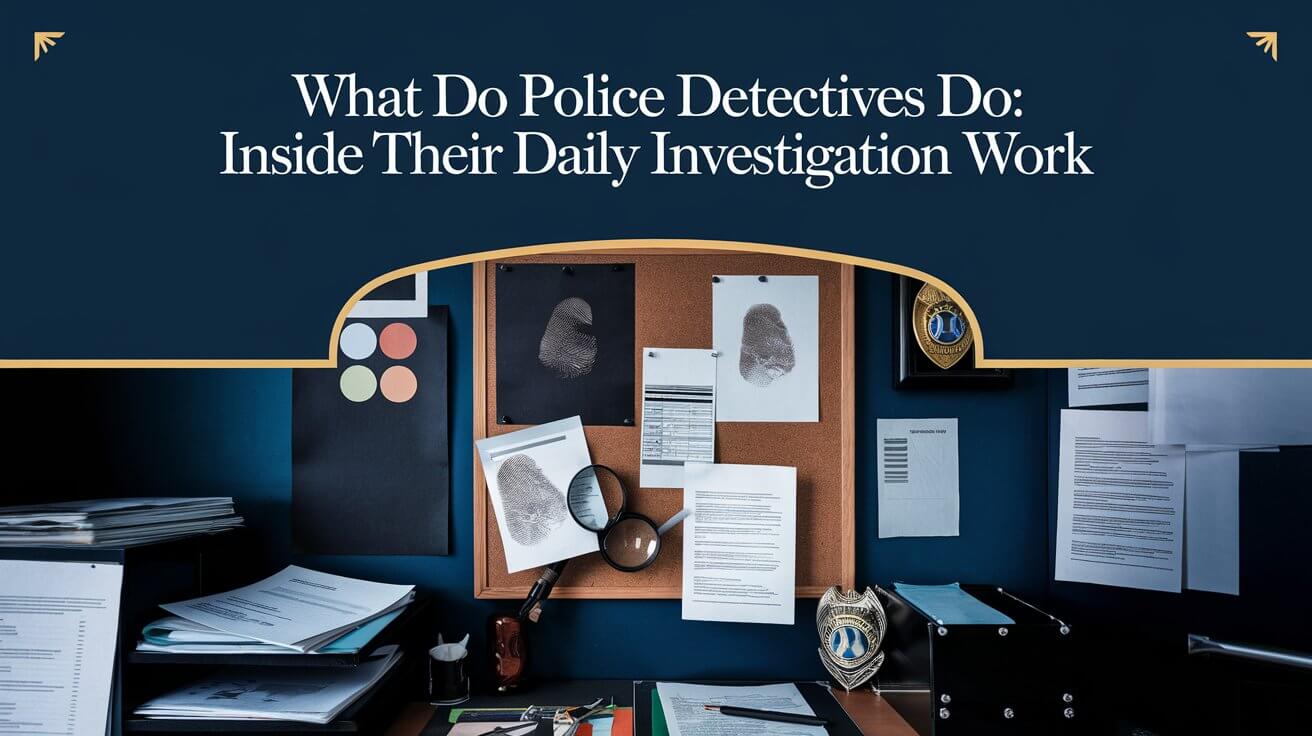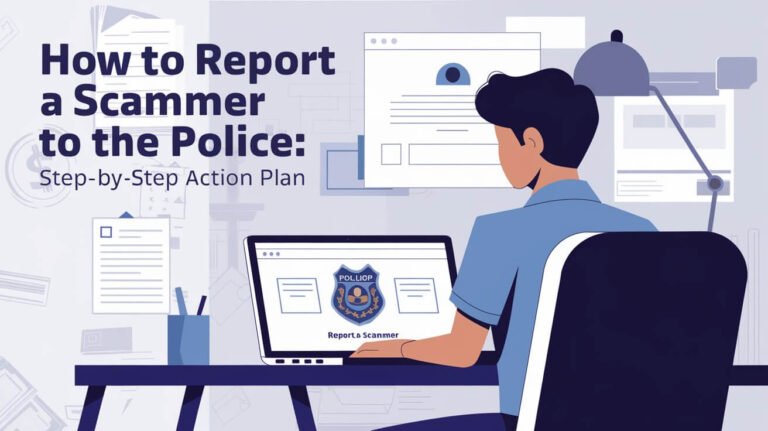What Do Police Detectives Do: Inside Their Daily Investigation Work

The life of a police detective goes far beyond what crime shows portray. Police detectives serve as the backbone of criminal investigations, working tirelessly to solve crimes and bring justice to victims. A detective’s median annual salary reaches $74,910, reflecting the complexity and importance of their work in law enforcement.
Daily Responsibilities of Police Detectives
Police detectives tackle complex criminal cases through methodical investigation techniques. Their work starts at crime scenes, where they collect vital evidence that could make or break a case. Each piece of evidence tells a story, and detectives must piece these stories together.
Crime Scene Investigation and Evidence Collection
A detective’s first priority at any crime scene focuses on preserving and collecting evidence. They photograph the scene, document evidence locations, and work with forensic teams to gather physical evidence. Detectives look for fingerprints, DNA samples, weapons, and any items that could connect to the crime.
Major evidence types detectives collect include:
- Hair and fiber samples
- Blood and bodily fluids
- Fingerprints
- Footprints
- Digital evidence
- Documents
- Weapons
- Trace evidence
Interview and Interrogation Procedures
Detectives spend significant time interviewing witnesses and interrogating suspects. They must stay calm and think clearly while questioning people involved in the case. Each interview could reveal crucial details that help solve the crime.
Key interviewing responsibilities include:
- Questioning witnesses about what they saw
- Taking detailed statements from victims
- Conducting formal suspect interrogations
- Recording and documenting all interviews
- Following up on new leads from interviews
Case Documentation and Report Writing
Every case requires extensive documentation. Detectives write detailed reports about:
- Crime scene observations
- Evidence collected
- Witness statements
- Suspect interviews
- Investigation progress
- Case theories
- Follow-up actions
These reports become vital for:
- Building strong court cases
- Sharing information with other officers
- Tracking investigation progress
- Supporting prosecution efforts
- Future case reference
Surveillance Operations
Detectives often conduct surveillance to gather evidence and monitor suspects. This work requires patience and attention to detail. Modern surveillance combines traditional observation with technology.
Common surveillance methods include:
- Physical observation
- Video monitoring
- Social media tracking
- Electronic surveillance
- Undercover operations
Types of Police Detective Specializations
Modern police work requires specialized expertise. Detectives typically focus on specific crime types to develop deep knowledge and skills.
Homicide Detective Duties
Homicide detectives investigate deaths under suspicious circumstances. They work closely with medical examiners and forensics teams to determine cause of death and identify suspects.
Key responsibilities include:
- Examining crime scenes
- Collecting murder weapons
- Interviewing witnesses
- Building victim profiles
- Establishing timelines
- Working with forensics experts
Narcotics Investigation Work
Narcotics detectives focus on drug-related crimes. They often work undercover and coordinate with multiple agencies to dismantle drug trafficking operations.
Their work involves:
- Conducting drug raids
- Infiltrating drug networks
- Making controlled buys
- Tracking drug shipments
- Building informant networks
Special Victims Division Cases
Special Victims Division detectives handle sensitive cases involving:
- Sexual assault
- Child abuse
- Domestic violence
- Human trafficking
- Crimes against elderly
These detectives need special training in:
- Trauma-informed interviewing
- Evidence collection
- Victim advocacy
- Child psychology
- Family dynamics
Cybercrime Detection
Cybercrime detectives investigate digital crimes using specialized computer skills. They handle cases involving:
- Online fraud
- Identity theft
- Computer hacking
- Digital evidence
- Online exploitation
Financial Crime Investigation
Financial crime detectives tackle complex economic crimes. They investigate:
- Money laundering
- Embezzlement
- Insurance fraud
- Banking crimes
- Corporate fraud
Cold Case Detective Work
Cold case detectives reexamine unsolved crimes using:
- New technology
- Fresh perspectives
- Modern forensics
- Updated databases
- Recent tips
Police Detective Work Environment
The detective’s workplace extends beyond the police station. They split time between office work and field investigations.
Office vs Field Work Balance
Office duties include:
- Writing reports
- Analyzing evidence
- Making phone calls
- Meeting with prosecutors
- Planning operations
Field work involves:
- Visiting crime scenes
- Interviewing witnesses
- Conducting surveillance
- Making arrests
- Collecting evidence
Working Hours and Schedules
Detective work demands flexibility. Crime doesn’t follow a schedule, so detectives must:
- Work irregular hours
- Respond to emergency calls
- Cover night shifts
- Work weekends
- Handle holiday coverage
Safety Considerations and Risks
Detective work carries significant risks. Officers face:
- Dangerous suspects
- Hostile situations
- Exposure to violence
- Chemical hazards
- Emotional trauma
Team Collaboration and Partnerships
Successful investigations require teamwork. Detectives collaborate with:
- Patrol officers
- Forensics teams
- Crime lab technicians
- Prosecutors
- Other agencies
Tools and Technology in Detective Work
Modern detective work relies heavily on technology. Detectives use advanced tools to solve crimes.
Digital Investigation Tools
Common digital tools include:
- Case management software
- Digital evidence systems
- Database search tools
- Analysis programs
- Communication systems
Forensic Equipment
Essential forensic tools:
- Evidence collection kits
- Photography equipment
- Fingerprint supplies
- DNA collection tools
- Crime scene markers
Database and Records Systems
Detectives access multiple databases:
- Criminal records
- Evidence databases
- Vehicle registrations
- Property records
- Background check systems
Surveillance Technology
Modern surveillance equipment includes:
- Video cameras
- GPS trackers
- Audio recorders
- Night vision gear
- Mobile surveillance units
Career Path and Requirements
Becoming a detective requires specific qualifications and ongoing training.
Education and Training
Basic requirements include:
- High school diploma minimum
- Police academy training
- College credits often preferred
- Specialized detective training
- Continuing education
Physical Requirements
Detectives must maintain:
- Physical fitness
- Shooting accuracy
- Driving skills
- Stamina
- Strength
Essential Skills
Critical detective skills include:
- Problem-solving
- Communication
- Observation
- Analysis
- Decision-making
Career Advancement Options
Career growth opportunities include:
- Specialization roles
- Supervisory positions
- Task force leadership
- Training roles
- Department leadership
Salary and Job Outlook
The detective career field offers competitive compensation and growth potential.
Pay Scale and Benefits
Current statistics show:
- Median salary: $74,910
- Hourly rate: $36.02
- Full benefits packages
- Overtime opportunities
- Retirement plans
Employment Growth Statistics
The field shows steady growth:
- 4% growth rate (2023-2033)
- 63,000 annual openings
- 28,700 new positions
- Strong job security
- Advancement potential
Geographic Variations in Salary
Pay varies by:
- Location
- Department size
- Experience level
- Specialization
- Rank
Career Opportunities
Detectives can work in:
- Municipal departments
- State agencies
- Federal bureaus
- Private sector
- Specialized units
Real-World Impact of Detective Work
Detective work directly affects public safety and justice.
Solving Major Cases
Successful investigations:
- Stop criminal activity
- Prevent future crimes
- Protect victims
- Recover stolen property
- Build legal cases
Community Protection
Detectives protect communities by:
- Preventing crime
- Removing dangerous offenders
- Building public trust
- Solving local problems
- Supporting victims
Crime Prevention
Prevention efforts include:
- Intelligence gathering
- Pattern analysis
- Public education
- Criminal monitoring
- Community outreach
Justice System Role
Detectives support justice through:
- Evidence collection
- Case preparation
- Court testimony
- Legal collaboration
- Victim advocacy
Police detective work combines investigation skills, technology, and dedication to justice. The field offers challenging work, competitive pay, and opportunities to make a real difference in communities. Success requires commitment, ongoing training, and the ability to adapt to changing criminal trends.






